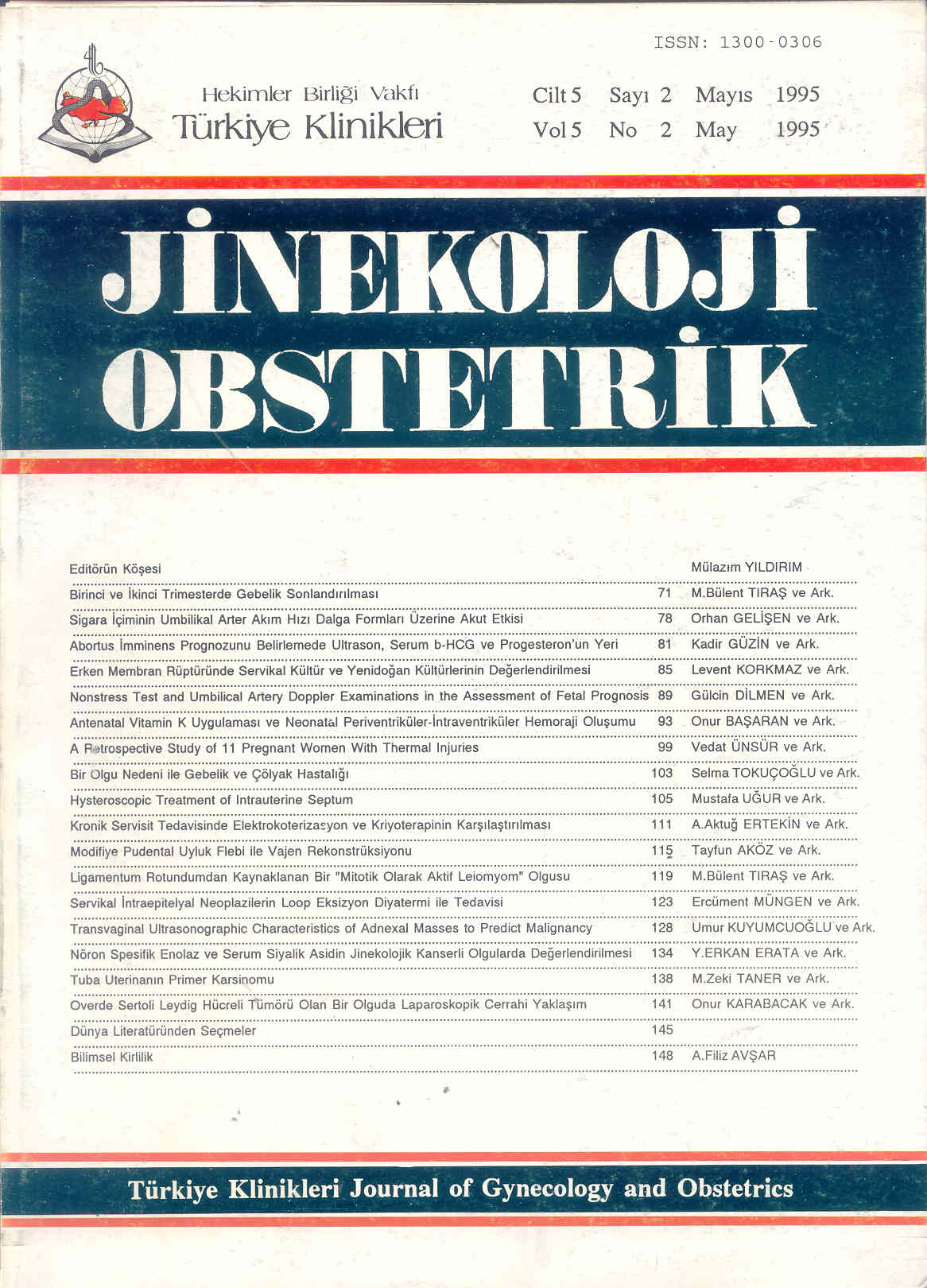Open Access
Peer Reviewed
ARTICLES
3058 Viewed1104 Downloaded
A Retrospective Study of 11 Pregnant Women with Thermal Injuries
Yanıklı 11 Gebenin Retrospektif Olarak İncelenmesi
Turkiye Klinikleri J Gynecol Obst. 1995;5(2):99-102
Article Language: TR
Copyright Ⓒ 2025 by Türkiye Klinikleri. This is an open access article under the CC BY-NC-ND license (http://creativecommons.org/licenses/by-nc-nd/4.0/)
ÖZET
Amaç: Gebelik sırasında oluşan termal kazalarda, anne ve fetus için morbidite ve mortalite oranlarını tesbit etmek. Çalışmanın Yapıldığı Yer: Ankara Numune Hastanesi, Kadın Hastalıkları ve Doğum Kliniği. Materyel ve Metod: 1986-1994 yılları arasında Ankara Numune Hastanesi Yanık Kliniğine yatırılan 917 hastadan gebe olan 11'i retrospektif olarak incelendi. Tüm olgular dokuzlar kuralı kullanılarak total vücut yüzey alanının yanık yüzdesine göre sınıflandırıldılar. Bulgular: Total vücut yüzey alanının, %50'den fazlasının yandığı iki olguda maternal ölüm oldu (%18.2). Bununla birlikte yanıkları takip eden 72 saat içinde de dört fetal ölüm gerçekleşti (%36.4). Sonuç: Maternal ve perinatal durumun, yanık komplikasyonlarının varlığı ve ciddiyeti ile fetusun gestasyonel yaşına bağlı olduğu görüldü. Perinatal mortalitenin yüksek olması, 32 haftadan büyük gebeliği olan ve ciddi düzeyde yanığı bulunan gebelerde obstetrik girişimin hemen yapılmasını zorunlu kılmaktadır.
Amaç: Gebelik sırasında oluşan termal kazalarda, anne ve fetus için morbidite ve mortalite oranlarını tesbit etmek. Çalışmanın Yapıldığı Yer: Ankara Numune Hastanesi, Kadın Hastalıkları ve Doğum Kliniği. Materyel ve Metod: 1986-1994 yılları arasında Ankara Numune Hastanesi Yanık Kliniğine yatırılan 917 hastadan gebe olan 11'i retrospektif olarak incelendi. Tüm olgular dokuzlar kuralı kullanılarak total vücut yüzey alanının yanık yüzdesine göre sınıflandırıldılar. Bulgular: Total vücut yüzey alanının, %50'den fazlasının yandığı iki olguda maternal ölüm oldu (%18.2). Bununla birlikte yanıkları takip eden 72 saat içinde de dört fetal ölüm gerçekleşti (%36.4). Sonuç: Maternal ve perinatal durumun, yanık komplikasyonlarının varlığı ve ciddiyeti ile fetusun gestasyonel yaşına bağlı olduğu görüldü. Perinatal mortalitenin yüksek olması, 32 haftadan büyük gebeliği olan ve ciddi düzeyde yanığı bulunan gebelerde obstetrik girişimin hemen yapılmasını zorunlu kılmaktadır.
ANAHTAR KELİMELER: Yanık, gebelik
ABSTRACT
Objective: To obtain the morbidity and mortality rates for mother and the fetus in pregnancies with thermal injury. Institution: Department of Gynecology and Obstetrics, Ankara Numune Hospital. Material and Methods: Out of 917 burn victims admitted to the Burn Unit of Ankara Numune Hospital between 1986 and 1994; 11 pregnant patients were scrutinized retrospectively. All patients were classified by using the rule of 9's. Findings: Two maternal deaths (18.2%) occured in patients with burns involving more than 50% of the skin surface area and 4 fetal deaths (36.4%) occured less than 72 hours after the burns. Results: The maternal and perinatal outcome is related to the extent, presence or absence of complications of burns and to the gestational age of the fetus. In view of the high perinatal mortality, patients with extensive burns who are more than 32 weeks' pregnant should be delivered soon after admission.
Objective: To obtain the morbidity and mortality rates for mother and the fetus in pregnancies with thermal injury. Institution: Department of Gynecology and Obstetrics, Ankara Numune Hospital. Material and Methods: Out of 917 burn victims admitted to the Burn Unit of Ankara Numune Hospital between 1986 and 1994; 11 pregnant patients were scrutinized retrospectively. All patients were classified by using the rule of 9's. Findings: Two maternal deaths (18.2%) occured in patients with burns involving more than 50% of the skin surface area and 4 fetal deaths (36.4%) occured less than 72 hours after the burns. Results: The maternal and perinatal outcome is related to the extent, presence or absence of complications of burns and to the gestational age of the fetus. In view of the high perinatal mortality, patients with extensive burns who are more than 32 weeks' pregnant should be delivered soon after admission.
MENU
POPULAR ARTICLES
MOST DOWNLOADED ARTICLES





This journal is licensed under a Creative Commons Attribution-NonCommercial-NoDerivatives 4.0 International License.










